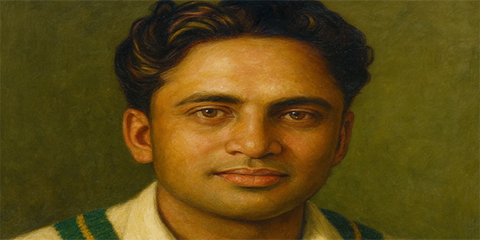Abdul Majid Bhatti: Pakistan's cricket journalism legend who covered 8 World Cups
JournalismPakistan.com | Published 3 months ago | Dr. Nauman Niaz (TI)
Join our WhatsApp channel
ISLAMABAD — Australia's tour of Pakistan in the winter of 1994–95 was no ordinary cricket series; it was a theatre of unease, a contest thickened by doubts that stretched well beyond the fence. The cricket was real, fierce, and at times sublime, but it unfolded under a sky heavy with suspicion. Every run, every wicket, seemed entangled with undertones that grew louder, until they became an echo that refused to leave.
Pakistan itself breathed tension. Conversations hushed, dressing rooms felt burdened, the applause of crowds carried an undertone of doubt. The purity of cricket, once untainted, now strains under the weight of unseen forces. What had been rumours at the margins had marched onto centre stage: match-fixing, once a ghost, had become a storm. The Singer Cup still hung in memory, its stain fresh, the sport's essence, its integrity beginning to tremble.
And yet, amid this turbulence, cricket endured. A perfect stroke, a ball reversing late, a contest fought to the last breath, these moments reminded all why the game mattered, even as it staggered under suspicion. Australia brought skill and swagger, but also became unwilling actors in a larger drama: a reckoning for the very soul of cricket. From the press box, it felt like more than a bat against a ball. It was a battle between purity and stain, truth and rumour. The game survived, scarred but resilient, its innocence lost but its spirit, fragile, flawed, enduring, still alive.
First Encounter: Meeting Abdul Majid Bhatti in Cricket's Turbulent Era
It was in this climate that I first met Abdul Majid Bhatti. I did not know then that Majid would become more than a colleague; he would become a companion in the unpredictable dramaturgy of cricket journalism. The clamour of deadlines, the rustle of speculation, the pursuit of truth amid rumour, these were the conditions in which his presence shone.
The Making of a Cricket Journalism Icon
By 1994, Majid Bhatti had already sculpted his name deep into the stone of Pakistan's cricket press. He was no ordinary reporter. His words carried weight because they were borne not of haste or sensation, but of understanding, a patient, hushed wisdom that connected cricket to the wider rhythms of the country. In a world where stories often burned and disappeared like sparks in the wind, his endured, scraped not only in the columns of newspapers but in the memory of those who read him.
He belonged to that rare breed who had watched the game evolve from grainy black-and-white stills on newsprint to the shimmering age of satellite television. Yet he never mistook technology for truth. The shine of a broadcast, the lure of a headline, none of it seduced him away from what mattered. His gift was humility, the ability to observe without intruding, to narrate without clamour. Like a lyricist using a keyboard deftly, he traced cricket's contours gently, but indelibly.
Dignified Reporting Style: Standing Apart from Sensationalism
Others rushed headlong at scandal, bowling accusations like bouncers meant to wound. Majid, though, was of a different pace. He was steady, probing, and unflustered. He reported without frills, never surrendering to the temptation of cheap noise. He trusted evidence, he sought voices that mattered, and above all, he relied on the sharp instincts honed from years in the field. He asked questions that needed to be asked, yet he framed them with a dignity that disarmed even those on the defensive. In the noisy theatre of the press box, his was the unchallenged authority of a man who knew when words could pierce and when silence could tell the greater story.
Tall and bespectacled, he carried a presence that softened the turbulence around him. His humour was gentle, his words measured, his gaze steady. He had little interest in portraying the world in absolutes of black and white; he dwelt in the greys, where the game and truth itself, often resides. For me, he became more than a colleague. He was an anchor, a reminder that amidst suspicion and clamour, cricket could still be told with dignity and honesty.
Career Journey: From Radio Pakistan to Jang Group Publications
In the shifting landscape of cricket journalism, few names have endured with such quiet permanence. For decades, his silhouette in the press box was as recognisable as the crack of a cover drive or the hush before an appeal. He stood not only as a reporter but as a custodian of cricket's truths, shaping discourse within Pakistan and extending his reach far beyond its borders. When he first picked up journalism in 1994 under the banner of the Jang Group of Publications, his words became more than reports; they became the cadences through which cricket's intricate flow was documented, polished with an elegance uniquely his own.
Yet Majid's arrival at Jang was not a beginning but a continuation. His route had already meandered through the venerable corridors of Radio Pakistan and onto the pages of Akhbar-e-Watan, Daily Jasarat, and Daily Aghaz. These were his apprenticeships, the early innings played when cricket still shimmered in the warm light of innocence, before cynicism began to seep into the game. Even then, there was sharpness in his eye, a clarity in his prose that belied his years. He understood not just the arithmetic of runs and wickets but the pulse of those who lived for the game, their hopes bound in every delivery, their sorrows sealed in every collapse. His writing, and later his appearances on television, distilled cricket's complexities into stories that millions could embrace, without ever surrendering its poetry.
Navigating Cricket's Darkest Period: The Late 1990s Scandal Era
The late 1990s and early 2000s were a time of great change in Pakistan's cricketing world. Allegations swirled, politics intruded, and the game seemed constantly perched on the edge of scandal. It was in this storm that Majid's voice mattered most. Where others rushed with half-truths, he steadied himself, refusing to trade accuracy for speed. His readers knew that when Majid Bhatti filed a story, it was anchored in substance, not heresy. He refrained from profanation and unorthodoxy. That was his gift: a refusal to be swept away by the currents of hysteria, a fidelity to the truth even when the truth was harder to tell.
Television Era: Joining Geo Television and Reaching Millions
With the rise of Geo Television in the early 2000s, Majid stepped into a new phase. The press box had already known his voice; now the living rooms of millions would hear it. On screen, his presence carried the same clarity that marked his print. He was not the showman, not the firebrand, he was the steady interpreter, guiding audiences through the tumult of tournaments, the drama of series, the shifting surges of cricket's fortunes. His words carried weight because they were rooted in authenticity. When he spoke of a collapse, he spoke of the players' human frailties, not just the numbers. When he described a triumph, it was not hollow cheerleading but an articulation of how the game lifted a nation's spirit.
Record Coverage: Eight World Cups and 600+ International Matches
Majid's breadth of experience is staggering. He has chronicled over eight World Cups, six T20 World Cups, four ICC Champions Trophies, and the beginnings of the IPL and ICL. He has covered more than six hundred international matches, his notes filling diaries with observations that stretch across continents and eras. But what made his coverage resonate was not the scale of his witness; it was his eye for detail, his refusal to lose sight of the smaller, quieter moments. He wrote of the silences in dressing rooms after defeat, the nervous tapping of a debutant's shoes, the sigh of an ageing player after one more tour. To Majid, cricket was never only about statistics; it was about stories, the human truths hidden between overs.
1996 World Cup Coverage: Empathetic Journalism at Its Best
I recall watching him during the 1996 World Cup, when Pakistan staggered under the weight of expectation. The press box seethed with rumours, some reporters rushing to file sensational copy. Majid sat apart, scribbling in neat, deliberate lines. Later, when his piece appeared, it was remarkable not for what it claimed, but for what it conveyed: the tension of a nation, the disappointment without venom, the sadness without malice. He showed us that journalism could be empathetic without being sentimental, firm without being cruel.
Investigative Excellence: Breaking Stories Through Patient Observation
There were times when his reporting cut through the fog like a flare. In Lahore, during a scandal that threatened to engulf the team, I remember fielding a call from Majid. His voice, calm as ever, carried details that I, despite my access, had not yet pieced together. He had already reached the heart of the matter, already separated truth from noise. That was Majid, always a step ahead, not because he hurried, but because he listened, watched, and understood.
Behind the glasses, there was always a glimmer, a spark of curiosity that never dulled with the years. His smile, quiet and knowing, carried the weight of someone who had seen storms pass but still searched for the subtler patterns in the clouds. He did not rush to judgement, nor surrender to easy outrage. Instead, he waited, observed, and only then released words that struck with the clarity of a well-timed drive, clean, measured, irrefutable.
Measured Response to Match-Fixing Era
Where others lunged, unflinching, into the fray of match-fixing, Waheed Khan, Faresteh Gati, even I unsheathed write-ups, he remained steady. Not evasive, not hiding behind oaken shelter, but neither did he bare his chest for stray bullets. His voice was tempered, not thunderous; reasoned, not reckless. He sought balance, not bravado, as though he knew that cricket, already fragile under suspicion's weight, needed not more fire but the slow, steady hand of moderation. In a theatre filled with clamour, his restraint became its own authority. Where our words tore through the page, his lingered, precise and deliberate, leaving an echo that endured long after the print had dried.
Humble Personality Behind the Professional Excellence
Despite his stature, Majid wore his fame lightly. In an industry often swollen with egos, he remained grounded, approachable. He could share a laugh, offer a word of encouragement, or ask after your family with the same ease with which he could dissect a player's technique. There was warmth in his presence, a humanity that softened the hard edges of the profession.
Bridging Literary Tradition with Modern Journalism
Majid straddled two worlds with rare poise. On one side was the literary tradition of Urdu journalism, steeped in metaphor, rich with imagery. On the other was the raw, unflinching clarity of modern reporting, where facts had to be verified and claims cross-checked. He managed to hold both together, weaving beauty and truth into a seamless whole. Reading his work was like hearing a ghazal delivered with the precision of a scorecard: lyrical yet factual, poetic yet grounded.
Memorable Match Coverage: The Rawalpindi Test Double Century
In Rawalpindi, during that unforgettable Test when debutants Azhar Mahmood and Ali Naqvi both struck centuries, the stadium was alive with the drama that only cricket can produce. Yet it was Majid's account that turned the match into history. He didn't simply record the numbers. He captured the mood of the crowd, the disbelief in the dressing room, the sudden swell of hope in a cricketing nation so used to heartbreak. That was his gift, to elevate a score into a story, to make the ephemeral endure.
Covering Cricket's Dark Side: Scandals and Administrative Failures
For all his elegance, Majid was never afraid of cricket's darker alleys. He covered match-fixing scandals, administrative failures, and the political battles that threatened to strangle the sport. But even here, his prose never lost its restraint. He did not accuse recklessly, nor did he shield the guilty. He reported what could be proven, asked what needed asking, and left the rest to time. His authority lay not in shouting louder than others but in the knowledge that when he spoke, he had earned the right to be heard.
Living Cricket Legacy: More Than Documentation
Majid's legacy is not simply that he has documented the game; it is that he has lived it. He has seen cricket in all its moods, the glory of triumphs, the despair of collapses, the murk of controversies. And through it all, he has written with a fidelity to the truth and a reverence for the game's poetry. His words have reminded us that cricket, like life, is both fragile and resilient, both beautiful and flawed.
Modern Cricket Era: PSL Coverage and Continued Excellence
Even now, in the gaudy light of the Pakistan Super League, where fireworks and music often threaten to drown the subtler rhythms of the sport, Majid remains a constant. Among the noise, his voice is steady, unshaken, guiding. He has become more than a journalist; he is an institution, a living archive of cricket's journey through Pakistan.
Mentorship and Teaching Legacy
For those of us who shared time with him, whether in the press box or on television, Majid Bhatti is more than a raconteur. He is a teacher, a mentor, a reminder of what journalism can be when it is practised with patience, integrity, and humility. In a profession often accused of chasing sensation, he has shown us the power of restraint. In a game often overwhelmed by numbers, he has reminded us of the importance of stories.
And perhaps that is his greatest gift: to make us see cricket not just as a contest of bat and ball, but as a mirror of ourselves, our hopes, our flaws, our resilience. Abdul Majid Bhatti has given the game not only his words but his wisdom, and in doing so, he has ensured that the story of cricket, in all its chaos and beauty, will always be told with dignity.
The Breadth of Witness: A Career Spanning Eras
What sets Majid apart is not only his longevity but the breadth of his witness. And he never saw cricket only in numbers. To him, the game's true essence was in the silences between deliveries, the sighs of a dressing room, the roar that followed a six. Majid recounted those moments with the precision of a historian and the tenderness of a lyricist.
Recognition Among Peers: More Than an Ordinary Correspondent
For those of us privileged to share screens with him, there was always the recognition that Majid Bhatti was no ordinary correspondent. He was a historian, a guide, a keeper of memory. His analysis was never draped in sensationalism; it was anchored in sincerity, in a lifetime of watching and listening. His words carried the weight of someone who had lived the game for decades, who had breathed its air, traced its patterns, endured its scandals, and celebrated its glories.
Unwavering Devotion to Truth
Throughout all this, one constant has endured: Majid Bhatti's unwavering devotion to the truth. Whether in print, on television, or from the vantage of the press box, his integrity was unwavering. In a world often blurred by rumour and spectacle, he remained a beacon of clarity. He has never written for the applause or the headlines; his allegiance has always been to the game itself, in all its beauty and chaos.
Professional Philosophy: Patience and Integrity
In the press box, when politics and suspicion seeped into cricket's narrative, Majid never lost sight of the heart of it all. While others rushed to publish, he waited, observed, then struck, his words timed like a perfect cover drive, graceful yet cutting. From him I learned that journalism, like cricket, is a game of patience and integrity, of respect for the craft. Majid has always been a man of dual worlds: literary in his Urdu sensibility, sharp in his journalistic craft. His words could soar with elegance yet cut with unsparing honesty. He has never shied from exposing cracks in cricket's edifice, yet he did so with a restraint that elevated his voice above the din. His writing has always been both beautiful and brutal, like the game itself.
Physical Presence and Professional Authority
Behind his spectacles lies a man of composure. Tall, burly, his frame commands, but it is his soft-spoken authority that lingers. He breaks stories with ease, digs deeper than most dare, and yet carries his fame lightly, often with a disarming smile. He listens before he speaks. When his words arrive, they are pearls, measured, weighted, timeless. Majid's legacy is not only in the matches he has covered but in the way he has lived the craft. A mentor, a colleague, a friend, his presence has shaped generations of journalists who watched him espouse patience with persistence, truth with grace. He has been part of cricket's greatest theatres, yet what defines him is not the scale of events but the humanity he brought to them.
Enduring Excellence in Modern Cricket
Even in the new world of PSL lights and Dubai's desert glamour, where I often met him again, Majid's authenticity never dimmed. Karachi's journalists often walked in packs, but Majid, efficient and purposeful, stood apart. His quiet brilliance filled rooms without fanfare. He never needed to shout to be heard. His authority was built on integrity, humility, and devotion to cricket. In a world increasingly dazzled by speed and spectacle, Abdul Majid Bhatti has remained cricket's quiet conscience, a man who has written its story not for fame or applause, but for the love of its beautiful, chaotic truth. He lives on.
Dr. Nauman Niaz is a civil award winner (Tamagha-i-Imtiaz) in Sports Broadcasting & Journalism, and is the sports editor at JournalismPakistan.com. He is a regular cricket correspondent, having covered 54 tours and three ICC World Cups, and having written over 3500 articles. He has authored 15 books and is the official historian of Pakistan Cricket (Fluctuating Fortunes IV Volumes - 2005). His signature show, Game On Hai, has been the highest in ratings and acclaim.

























